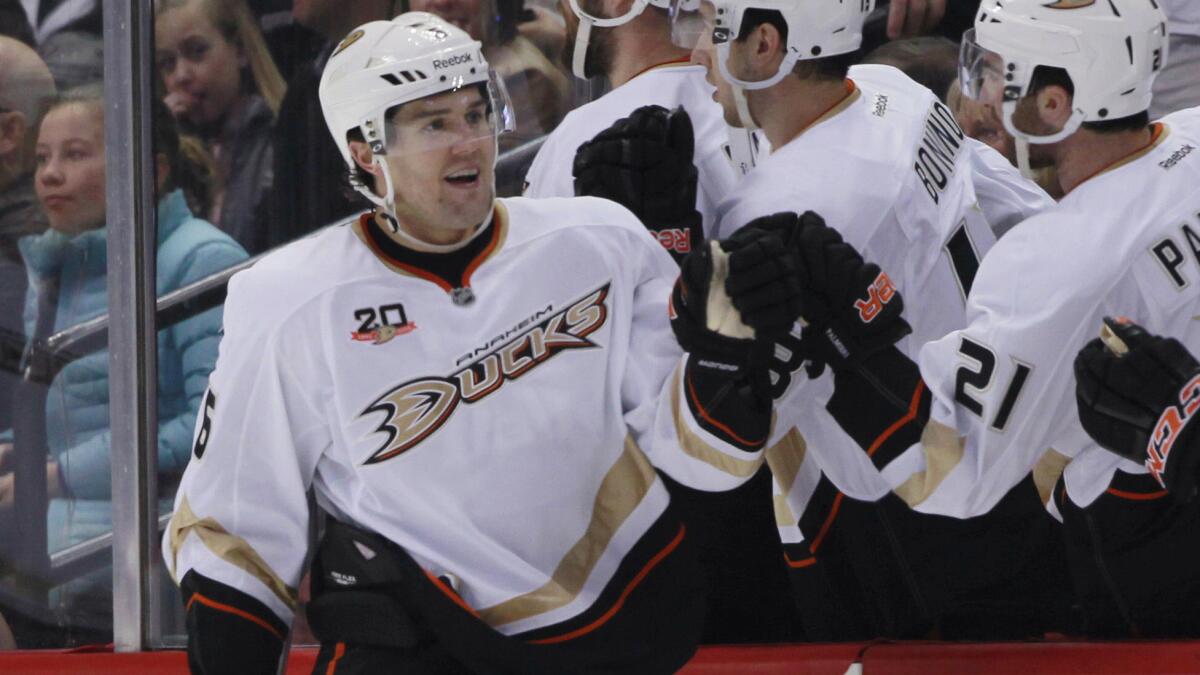Column: Ben Lovejoy has been a great fit with Ducks

Branded as a sixth or seventh defenseman by the Pittsburgh Penguins and unsure if he could rise above that ceiling, Ben Lovejoy wondered if his hockey career had stalled before it had really begun.
“I would have gone to Antarctica for a fresh start,” he said. “I would have done anything to start over and have a fresh set of eyes judging me and hoping that I could do more, but I didn’t know.”
Going to Anaheim made a trek to Antarctica unnecessary.
Lovejoy has flourished since the Ducks acquired him from the Penguins on Feb. 6, 2013 for a fifth-round draft pick and gave him the trust and playing time he craved. The 30-year-old native of Concord, N.H., has developed into an effective shutdown defenseman alongside Cam Fowler as well as an articulate, insightful voice in the locker room.
“I think a lot of Ben’s thing was confidence,” Coach Bruce Boudreau said. “At the time he came here, we were languishing. He didn’t expect anything. We didn’t expect anything, except we gave him an opportunity, and the more confidence he grew, he became a really good player.”
Lovejoy had five goals and 18 points in 78 games last season with a plus-21 defensive rating while averaging a career-high 19 minutes and 24 seconds of ice time. He also blocked 150 shots, second on the team. In the playoffs he had two goals in 13 games and was plus-one while averaging 19:38.
Impressive for a player who wasn’t drafted out of Dartmouth and couldn’t win a regular job with the Penguins after they signed him as a free agent in July 2008.
“Sometimes all it takes is the right situation for a player to blossom,” Fowler said. “He made the most of that opportunity. We certainly leaned on him a lot. Even the improvements he made last year were huge from the year before.”
Proof that the ceiling imposed on Lovejoy in Pittsburgh was way too low.
“That continues to drive me,” he said. “They had four very, very talented top-four defensemen who were paid a lot of money and were really good players. The coaching and management felt they were going to win with those guys and they were going to lose with those guys and I understood. I was happy and lucky to be in the NHL and wanted to do everything in my role I could to help the team.”
He endured some rough spots, committing turnovers in the playoffs against Philadelphia in 2012 and plunging to eighth on the depth chart. When the Penguins made him available, Ducks General Manager Bob Murray capitalized on the chance to bring him into a system that takes advantage of his skating skills.
Maybe, too, Lovejoy was meant to be in Anaheim instead of Antarctica or Pittsburgh.
He had played his first professional season in Wilkes-Barre, Pa., on an American Hockey League contract. After his team defeated the Portland Pirates, then run by Murray as the Ducks’ top farm team, Murray offered him a contract. So did the Penguins.
“I felt that Pittsburgh had given me an opportunity and I wanted to stay,” Lovejoy said. “When I was traded here, Bob Murray said that he wanted me to be that player that he saw then, and I’ve been lucky that everybody here has given me the opportunity to do that.”
Lovejoy — who signed a three-year, $3.3-million extension in June 2013 — is thriving off the ice too. He and his wife, Avery, a former squash team captain at Dartmouth, became parents of a daughter, Lila, last New Year’s Eve. He also has become a go-to guy for reporters seeking thoughtful observations on games or other hockey topics.
But last summer, after the Ducks were eliminated by the Kings in the second round of the playoffs, Lovejoy wanted nothing to do with hockey or the media for a while. He didn’t watch the rest of the playoffs, didn’t have the TV on even in the background during the Stanley Cup Final. Losing to the Kings hurt him too much.
“That was a real kick in the stomach,” he said. “We came in and we thought we were the better team. We had a better regular season, but in the end, that doesn’t matter. They proved in a very decisive seventh game that they were better than us, and that was a tough thing to sit with all summer, to watch L.A.’s next four weeks thinking, ‘I really wish it had been us.’”
His jealousy has given way to optimism triggered by off-season moves made by the Ducks — such as the trade for center Ryan Kesler — designed to add depth up the middle and match up better against teams like the Kings.
“I think there’s a new energy in this room, a feeling that these guys can put us over the top,” Lovejoy said. “But right now, that team is the champion and they will be for at least the next nine months.”
Until they’re knocked off, anyway. “I hope so,” he said, “and I hope it’s us.”
More to Read
Go beyond the scoreboard
Get the latest on L.A.'s teams in the daily Sports Report newsletter.
You may occasionally receive promotional content from the Los Angeles Times.



